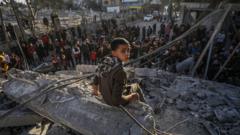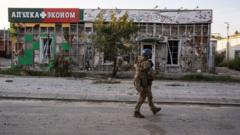With the clock ticking down to a fragile ceasefire agreement, Gazans navigate fear and desperation amidst heartbreaking losses and severe infrastructural damage. As airstrikes persist, residents yearn for relief while grappling with the overwhelming impacts of prolonged conflict.
Gazans Strain Under Pressure as Ceasefire Looms Amid Destruction

Gazans Strain Under Pressure as Ceasefire Looms Amid Destruction
Residents in Gaza brace for a temporary ceasefire as airstrikes continue, highlighting the devastation that war has wrought on the region.
Civilians in Gaza remain on edge as they anticipate a much-needed ceasefire agreement, even as Israeli airstrikes continue to ravage the region. A temporary ceasefire and hostage exchange deal approved by Israel's cabinet brought a glimmer of hope, but the immediate aftermath has been marked by further violence. According to the Hamas-run civil defense agency, at least 113 people have been killed since the preliminary agreement was reached on Wednesday.
The finalized ceasefire, set to take effect on Sunday, has left residents anxiously counting down the hours as airstrikes show no sign of abating. "Time is moving slower than ever," shares Dr. Abdallah Shabir, who works as an emergency doctor at the Baptist Hospital in Gaza City. With airstrikes serving as a constant threat, he elaborates on the trauma faced by those in the hospital, detailing a recent wave of severe injuries and fatalities that overwhelmed the facility following the announcement.
The toll of the war is staggering, with reports indicating that approximately 69% of Gaza's structures are either completely destroyed or severely damaged, according to the United Nations Satellite Centre. Dr. Hala Abu Ahmed, a dedicated internal medicine specialist, tragically lost her life in the chaos, representing the profound loss felt among healthcare workers who have been fighting against impossible odds.
Amid the rubble, many displaced individuals desperately await the chance to return home. Sabreen Doshan, who has lost 17 family members throughout the conflict, shares her poignant determination to return to the remnants of her home, even if it means living in a tent on the debris. "Nowhere can satisfy me now apart from home," she explains, illustrating the haunting essence of loss and longing in a war-torn environment.
The emotional conflict of relief and grief is echoed by Wael Muhammad, a freelance journalist in central Gaza, who expresses a complex mixture of joy and sorrow over the potential ceasefire. "From one moment to another, from joy to pain," he says, emphasizing the overwhelming struggle Gazans face each day.
As the ceasefire negotiation progresses toward potential implementation, worries linger about its viability and the impending hostages' exchange. Juliette Touma, a communications director for UNRWA, warns of the dire living conditions for those who have sought refuge, as shelters overflow and basic necessities remain scarce. "I would not call these living conditions — they are not conditions fit for human beings," she concludes.
In the final hours leading to Sunday, Gazans silently pray for a pause in violence while retaining their fears of renewed conflict. "We are afraid of any change, any movement," says Khalil Nateel, contemplating the uncertain future from his shelter in central Gaza. The hearts and minds of Gazans are caught in an ongoing struggle, reflecting the complex dynamics of hope and despair amidst war's devastating grip.























